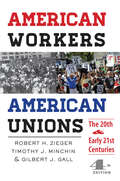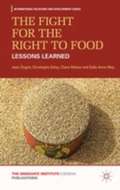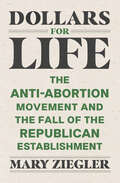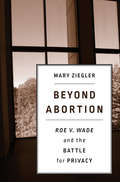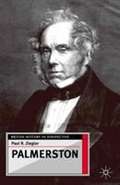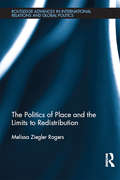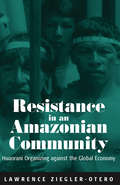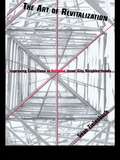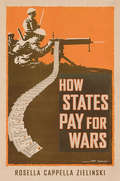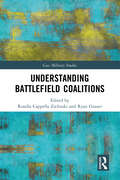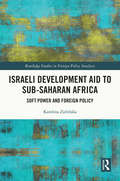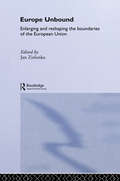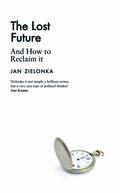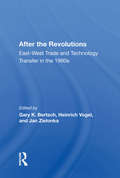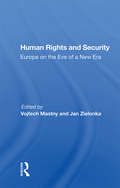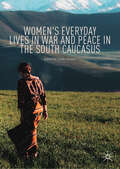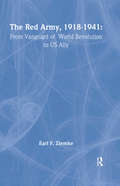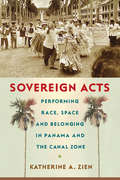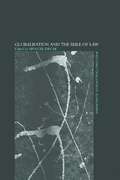- Table View
- List View
American Workers, American Unions: The Twentieth and Early Twenty-First Centuries (The American Moment)
by Robert H. Zieger Timothy J. Minchin Gilbert J. GallAn update to the classic history of labor and unions for a post-9/11 world.Highly acclaimed and widely read since its first publication in 1986, American Workers, American Unions provides a concise and compelling history of American workers and their unions in the twentieth century and the first decade of the twenty-first. Taking into account recent important work on the 1970s and the Reagan revolution, the fourth edition newly considers the stagflation issue, the rise of globalization and big box retailing, the failure of Congress to pass legislation supporting the right of public employees to collective bargaining, the defeat in Congress of legislation to revise the National Labor Relations Act, the emasculation of the Humphrey-Hawkins Act, and the changing dynamics of blue-collar politics. In addition to important new information on the 1970s and 1980s, the fourth edition contains a completely new final chapter. Largely written by Timothy J. Minchin, this chapter provides a rare survey of American workers and their unions between 9/11 and the 2012 presidential election. Gilbert J. Gall presents new information on government workers and their recent battles to defend workplace rights.
Why Regional Parties?
by Adam ZiegfeldToday, regional parties in India win nearly as many votes as national parties. In Why Regional Parties?, Professor Adam Ziegfeld questions the conventional wisdom that regional parties in India are electorally successful because they harness popular grievances and benefit from strong regional identities. He draws on a wide range of quantitative and qualitative evidence from over eighteen months of field research to demonstrate that regional parties are, in actuality, successful because they represent expedient options for office-seeking politicians. By focusing on clientelism, coalition government, and state-level factional alignments, Ziegfeld explains why politicians in India find membership in a regional party appealing. He therefore accounts for the remarkable success of India's regional parties and, in doing so, outlines how party systems take root and evolve in democracies where patronage, vote buying, and machine politics are common.
The Fight for the Right to Food
by Jean Ziegler Christophe Golay Claire Mahon Sally-Anne WayThis book documents and analyzes the experiences of the UN's first Special Rapporteur on the Right to Food. It highlights the conceptual advances in the legal understanding of the right to food in international human rights law, as well as analyzes key practical challenges through experiences in 11 countries across Africa, Asia and Latin America.
After Roe: The Lost History of the Abortion Debate
by Mary ZieglerForty years after the U.S. Supreme Court handed down its decision legalizing abortion, Roe v. Wade continues to make headlines. After Roe: The Lost History of the Abortion Debate cuts through the myths and misunderstandings to present a clear-eyed account of cultural and political responses to the landmark 1973 ruling in the decade that followed. The grassroots activists who shaped the discussion after Roe, Mary Ziegler shows, were far more fluid and diverse than the partisans dominating the debate today.<P><P>
Dollars for Life: The Anti-Abortion Movement and the Fall of the Republican Establishment
by Mary ZieglerA new understanding of the slow drift to extremes in American politics that shows how the antiabortion movement remade the Republican Party &“A timely and expert guide to one of today&’s most hot-button political issues.&”—Publishers Weekly (starred review) &“A sober, knowledgeable scholarly analysis of a timely issue.&”—Kirkus Reviews &“[Ziegler&’s] argument in [is] that, over the course of decades, the anti-abortion movement laid the groundwork for an insurgent candidate like Trump.&”—Jennifer Szalai, New York Times The modern Republican Party is the party of conservative Christianity and big business—two things so closely identified with the contemporary GOP that we hardly notice the strangeness of the pairing. Legal historian Mary Ziegler traces how the anti-abortion movement helped to forge and later upend this alliance. Beginning with the Supreme Court&’s landmark decision in Buckley v. Valeo, right‑to‑lifers fought to gain power in the GOP by changing how campaign spending—and the First Amendment—work. The anti-abortion movement helped to revolutionize the rules of money in U.S. politics and persuaded conservative voters to fixate on the federal courts. Ultimately, the campaign finance landscape that abortion foes created fueled the GOP&’s embrace of populism and the rise of Donald Trump. Ziegler offers a surprising new view of the slow drift to extremes in American politics—and explains how it had everything to do with the strange intersection of right-to-life politics and campaign spending.
Beyond Abortion: <i>Roe v. Wade</i> and the Battle for Privacy
by Mary Ziegler ZieglerFor most Americans today, Roe v. Wade concerns just one thing: the right to choose abortion. But the Supreme Court’s decision once meant much more. The justices ruled that the right to privacy encompassed the abortion decision. Grassroots activists and politicians used Roe—and popular interpretations of it—as raw material in answering much larger questions: Is there a right to privacy? For whom, and what is protected? As Mary Ziegler demonstrates, Roe’s privacy rationale attracted a wide range of citizens demanding social changes unrelated to abortion. Movements questioning hierarchies based on sexual orientation, profession, class, gender, race, and disability drew on Roe to argue for an autonomy that would give a voice to the vulnerable. So did advocates seeking expanded patient rights and liberalized euthanasia laws. Right-leaning groups also invoked Roe’s right to choose, but with a different agenda: to attack government involvement in consumer protection, social welfare, racial justice, and other aspects of American life. In the 1980s, seeking to unify a fragile coalition, the Republican Party popularized the idea that Roe was a symbol of judicial tyranny, discouraging anyone from relying on the decision to frame their demands. But Beyond Abortion illuminates the untapped potential of arguments that still resonate today. By recovering the diversity of responses to Roe, and the legal and cultural battles it energized, Ziegler challenges readers to come to terms with the uncomfortable fact that privacy belongs to no party or cause.
Palmerston (British History In Perspective Ser.)
by Paul R. ZieglerIn serving more than fifty years in public life, Palmerston placed his stamp upon nineteenth-century Britain. Born and bred an eighteenth-century aristocrat, he initially seemed out of place in a world stirred by the twin forces of the French and Industrial Revolutions, and more suited to the dandified life of the beau monde. As a conservative politician, he appeared ill fit for an age of reform, and as Foreign Secretary his gunboat diplomacy courted war and revolution at a time when European diplomats were seeking peace and stability. However, as Paul R. Ziegler's compelling biography shows, the 3rd Viscount Palmerston was a man of contradictions. Despite his aristocratic roots and playboy image, Palmerston was a tireless public servant and a meticulous planner, who identified himself with the people and became their natural spokesperson - a role which culminated in his eventual election as Prime Minister. Whilst fearing the advent of democracy, he was willing to experiment with reform; and although seemingly averse to the onrush of modernity, he nevertheless seized the initiative both at home and abroad in leading his nation into the future. Taking into account recent scholarship and revisionist approaches, Ziegler authoritatively reviews the life of this well-known political figure and reassesses his contribution to the nineteenth century - demonstrating that, in facing new challenges, Palmerston adjusted himself to the times and helped to usher Britain into the modern age.
George VI: The Dutiful King (Penguin Monarchs)
by Philip ZieglerWritten by Philip Ziegler, one of Britain's most celebrated biographers, George VI is part of the Penguin Monarchs series: short, fresh, expert accounts of England's rulers in a collectible formatIf Ethelred was notoriously 'Unready' and Alfred 'Great', King George VI should bear the title of 'George the Dutiful'. Throughout his life, George dedicated himself to the pursuit of what he thought he ought to be doing rather than what he wanted to do. Inarticulate and loathing any sort of public appearances, he accepted that it was his destiny to figure conspicuously in the public eye, gritted his teeth, battled his crippling stammer and got on with it. He was not born to be king, but he made an admirable one, and was the figurehead of the nation at the time of its greatest trial, the Second World War. This is a brilliant, touching and sometimes funny book about this reluctant public figure, and the private man.Philip Ziegler is the author of the authorised biographies of Mountbatten, Harold Wilson and Edward Heath. His other books include The Duchess of Dino, William IV, The Black Death and most recently Olivier. Initially a diplomat, he worked for many years in book publishing before becoming a full-time writer.
The Politics of Place and the Limits of Redistribution (Routledge Advances in International Relations and Global Politics)
by Melissa Ziegler RogersNumerous scholars have noticed that certain political institutions, including federalism, majoritarian electoral systems, and presidentialism, are linked to lower levels of income redistribution. This book offers a political geography explanation for those observed patterns. Each of these institutions is strongly shaped by geography and provides incentives for politicians to target their appeals and government resources to localities. Territorialized institutions also shape citizens’ preferences in ways that can undermine the national coalition in favor of redistribution. Moreover, territorial institutions increase the number of veto points in which anti-redistributive actors can constrain reform efforts. These theoretical connections between the politics of place and redistributive outcomes are explored in theory, empirical analysis, and case studies of the USA, Germany, and Argentina.
Voting Rights of Refugees
by Ruvi ZieglerVoting Rights of Refugees develops a novel legal argument about the voting rights of refugees recognised in the 1951 Geneva Convention. The main normative contention is that such refugees should have the right to vote in the political community where they reside, assuming that this community is a democracy and that its citizens have the right to vote. The book argues that recognised refugees are a special category of non-citizen residents: they are unable to participate in elections of their state of origin, do not enjoy its diplomatic protection and consular assistance abroad, and are unable or unwilling, owing to a well-founded fear of persecution, to return to it. Refugees deserve to have a place in the world, in the Arendtian sense, where their opinions are significant and their actions are effective. Their state of asylum is the only community in which there is any prospect of political participation on their part.
Resistance In An Amazonian Community
by Lawrence Ziegler-OteroLike many other indigenous groups, the Huaorani of eastern Ecuador are facing many challenges as they attempt to confront the globalization of capitalism in the 21st century. In 1991, they formed a political organization as a direct response to the growing threat to Huaorani territory posed by oil exploitation, colonization, and other pressures. The author explores the structures and practices of the organization, as well as the contradictions created by the imposition of an alien and hierarchical organizational form on a traditionally egalitarian society. This study has broad implications for those who work toward "cultural survival" or try to "save the rainforest."
The Art of Revitalization: Improving Conditions in Distressed Inner-City Neighborhoods (Contemporary Urban Affairs #Vol. 12)
by Sean ZielenbachThis book discusses the revitalization of decayed inner-city neighborhoods. It explores the role of social capital in stabilizing and turning around distressed communities, and it highlights the roles that local actors can and do play in the revitalization process.The Art of Revitalization takes two Chicago neighborhoods, Englewood and North Lawndale, as case studies. Zielenbach discusses them in the context of racial change and urban decay in Chicago since World War II. The account of the changing neighborhoods is fascinating and clear, and the strength of the author's portrayal of Chicago's transformation sets the stage for his detailed analysis.
How States Pay for Wars
by Rosella Capella ZielinskiArmies fight battles, states fight wars. To focus solely on armies is to neglect the broader story of victory and defeat. Military power stems from an economic base, and without wealth, soldiers cannot be paid, weapons cannot be procured, and food cannot be bought. War finance is among the most consequential decisions any state makes: how a state finances a war affects not only its success on the battlefield but also its economic stability and its leadership tenure. In How States Pay for Wars, Rosella Cappella Zielinski clarifies several critical dynamics lying at the nexus of financial and military policy.Cappella Zielinski has built a custom database on war funding over the past two centuries, and she combines those data with qualitative analyses of Truman's financing of the Korean War, Johnson’s financing of the Vietnam War, British financing of World War II and the Crimean War, and Russian and Japanese financing of the Russo-Japanese War. She argues that leaders who attempt to maximize their power at home, and state power abroad, are in a constant balancing act as they try to win wars while remaining in office. As a result of political risks, they prefer war finance policies that meet the needs of the war effort within the constraints of the capacity of the state.
Understanding Battlefield Coalitions (Cass Military Studies)
by Rosella Cappella Zielinski Ryan GrauerThis book improves our understanding of battlefield coalitions, providing novel theoretical and empirical insight into their nature and capabilities, as well as the military and political consequences of their combat operations. The volume provides the first dataset of battlefield coalitions, uses primary sources to understand how non-state actors of varying types form such groupings, reports interviews with policymakers illuminating North Atlantic Treaty Organization operations, and uses cases studies of various wars waged throughout the nineteenth, twentieth, and twenty-first centuries to understand how other such collectives have operated. Part I introduces battlefield coalitions as an object of study, demonstrating how they are distinct from other wartime collectives. Using a novel dataset of actors fighting in 492 battles during interstate wars waged between 1900 and 2003, it provides, for the first time, a comprehensive portrait of the universe of battlefield coalitions. Part II explores processes and dynamics involved in the formation of battlefield coalitions, addressing how potential coalition members prepare for future battles in peacetime (as well as the consequences of such preparations) and the dynamics of mission design. Part III focuses on how battlefield coalitions are organised and fight when combat ensues, notably their decision-making rules and practices, command structures, and learning capacities. Part IV addresses three curious tendencies observed in the operations of battlefield coalitions: partners under-providing effort in combat, rebels and terrorist networks persisting in cooperation even when their interests diverge, and members defecting from the collective. Part V concludes with a chapter outlining for future researchers what we know about battlefield coalitions and what remains to be understood. This book will be of much interest to students of military and strategic studies, defence studies and International Relations.
Israeli Development Aid to Sub-Saharan Africa: Soft Power and Foreign Policy (Foreign Policy Analysis)
by Karolina ZielińskaThis book deals with Israeli development aid to Sub-Saharan Africa countries as a part of Israeli foreign policy. The analysis is framed by the concept of soft power: an assumption that development cooperation increases attractiveness of the donor and contributes to constructive bilateral and multilateral relations. Israel is a particular case of a donor, as it concentrates on technical aid and its aid is motivated by a particular set of ideological and pragmatic motives.Covering the period since the 1950s till today, the book analyses particular Israeli resources relevant for African development and the system and contents of Israeli development aid, with a particular focus on a new phenomenon of the engagement of businesses and NGOs.Zielińska explores the geopolitical context of Israeli aid for Sub-Saharan countries and the recipients’ perception of Israeli aid; asking if and how these attitudes influence the recipients’ behaviour towards Israel within their bilateral relations as well as on multilateral forums. Contributing to the knowledge of development diplomacy as a form of expression of soft power and as a tool of foreign policy, it will be of interest to international relations’ students and faculty as well as to other people professionally dealing with Israeli foreign policies.
Europe Unbound: Enlarging and Reshaping the Boundaries of the European Union (Routledge Advances in European Politics)
by Jan ZielonkaEurope Unbound provides an analysis of the enlargement of the European Union and examines from both a theoretical and a political approach issues such as:* Where does Europe end?* Should Europe's borders be open or closed?* How does the evolution of territorial politics impact on the course of European integration?This book draws upon such diverse fields as History, Sociology, Political Science and International Relations and contains contributions from an international range of respected academics.
The Lost Future: And How to Reclaim It
by Jan ZielonkaA timely and compelling argument for a revitalized and restructured global politics The future seems increasingly uncertain. Our democracies are failing to prevent financial crises, energy shortages, climate change, and war—so how can we look to the future with confidence? Jan Zielonka argues that it is democracy&’s shortsightedness that makes politics stumble in our increasingly connected world. With our governments still confined to the borders of nation-states, defending the short-term interests of present-day voters, the consequences for future generations are dire. In this incisive account, Zielonka makes a bold case for a new politics of time and space. He considers how democracy should adjust to the world of high speed, and he questions our everyday experiences as citizens: Is it acceptable for authorities and firms to monitor our whereabouts? Why is the distribution of time and space so unequal? And, most crucially, can we construct a new system of governance that will allow us to plan ahead with certainty?
After The Revolutions: East-west Trade And Technology Transfer In The 1990s
by Jan Zielonka Gary K. Bertsch Heinrich VogelThis book presents various aspects of the changing nature of East-West relations and attempts to anticipate future trends in East-West trade and technology transfer, dealing with the evolution of national approaches towards trade and technology transfer.
Human Rights And Security: Europe On The Eve Of A New Era
by Jan Zielonka Vojtech MastnyInquiries into the relationship between security and human rights are of very recent vintage. They have long been hampered by political scientists' predilection for political "realism." From that perspective, there seemed little doubt that power comes first and any human rights but a poor second. As wishful thinking turned into reality during the Eastern European revolutions of 1989, the limitations of such shortsighted realism became apparent. This book examines the causes and consequences of the emerging new relationship between security and human rights. It is divided into two parts, which deal respectively with security and human rights and their relationship to states and societies. What is the theoretical linkage between security and human rights? How has this linkage evolved within the context of East-West relations? What was the particular role of the Helsinki process in shaping this evolution? How do these issues affect the difficult transition from dictatorship to pluralism in countries facing the challenge of ethnic, economic, and social dislocation? The contributors to this volume seek to deepen our understanding of the forces that brought about the collapse of communism in Europe, and they explore the broader implications of change for the emerging post-cold war international order.
Contested Commemorations
by Benjamin ZiemannThis innovative study of remembrance in Weimar Germany analyses how experiences and memories of the Great War were transformed along political lines after 1918. Examining the symbolism, language and performative power of public commemoration, Benjamin Ziemann reveals how individual recollections fed into the public narrative of the experience of war. Challenging conventional wisdom that nationalist narratives dominated commemoration, this book demonstrates that Social Democrat war veterans participated in the commemoration of the war at all levels: supporting the 'no more war' movement, mourning the fallen at war memorials and demanding a politics of international solidarity. It describes how the moderate Socialist Left related the legitimacy of the Republic to their experiences in the Imperial army and acknowledged the military defeat of 1918 as a moment of liberation. This is the first comprehensive analysis of war remembrances in post-war Germany and a radical reassessment of the democratic potential of the Weimar Republic.
Women's Everyday Lives in War and Peace in the South Caucasus
by Ulrike ZiemerThis edited volume explores the everyday struggles and challenges of women living in the South Caucasus. The primary aim of the collection is to shift the pre-occupation with geopolitical analysis in the region and to share new empirical research on women and social change. The contributors discuss a broad range of topics, each relating to women’s everyday challenges during periods (past and present) of turbulent transformation and conflict, thus helping make sense of these transformations as well as adding new empirical insights to larger questions on life in the South Caucasus. Part I begins the discussion of women and social change in Armenia, Georgia and Azerbaijan by examining the contradictions between traditional gender roles and emancipation and how they continue to dictate women’s lives. Part II focuses on women’s experiences of war and conflict in Azerbaijan, Armenia, Georgia and Nagorny Karabakh, as well as displacement from Abkhazia and Azerbaijan. Part III examines the challenges faced by sexual minorities in Georgia and feminist activism in Azerbaijan. Women's Everyday Lives in War and Peace in the South Caucasus will be of interest to students and scholars across a range of disciplines, including sociology, politics, gender studies and history.
Zur Relevanz der schulischen Sozialbeziehungen für die politische Unterstützung im Jugendalter
by Johanna Fee ZiemesIn diesem Buch untersucht Johanna F. Ziemes die Relevanz von Sozialbeziehungen für die politische Sozialisation von Schüler*innen. Schüler*innen sind heranwachsende Bürger*innen, die Aspekte der politischen Unterstützung entwickeln und verleihen. Hierzu gehören Einstellungen, Identitäten und Werte. Die politische Unterstützung von den heranwachsenden Bürger*innen ist für Demokratien relevant. Auf Grundlage der Daten der International Civic and Citizenship Education Study 2016 (ICCS 2016) werden verschiedene schulische Bedingungen für die Entwicklung politischer Unterstützung untersucht und diskutiert. Besonders im Vordergrund stehen hier die schulischen Sozialbeziehungen als Aspekt des Schulklimas. Die vorgestellten Studien betonen die Relevanz der Sozialbeziehungen für die politische Sozialisation.
The Red Army, 1918-1941: From Vanguard of World Revolution to America's Ally
by Earl F ZiemkeSupported in large part by evidence released after the collapse of the Soviet Union, this book follows the career of the Red Army from its birth in 1918 as the designated vanguard of world revolution to its affiliation in 1941 with 'the citadel of capitalism', the United States. Effectiveness of leadership and military doctrine are particular conce
Sovereign Acts: Performing Race, Space, and Belonging in Panama and the Canal Zone
by Katherine A. ZienSovereign Acts explores how artists, activists, and audiences performed and interpreted sovereignty struggles in the Panama Canal Zone, from the Canal Zone’s inception in 1903 to its dissolution in 1999. In popular entertainments and patriotic pageants, opera concerts and national theatre, white U.S. citizens, West Indian laborers, and Panamanian artists and activists used performance as a way to assert their right to the Canal Zone and challenge the Zone’s sovereignty, laying claim to the Zone’s physical space and imagined terrain. By demonstrating the place of performance in the U.S. Empire’s legal landscape, Katherine A. Zien transforms our understanding of U.S. imperialism and its aftermath in the Panama Canal Zone and the larger U.S.-Caribbean world.
Globalisation and the Rule of Law (Challenges of Globalisation)
by Spencer ZifcakGlobalisation and the Rule of Law reassesses the idea of the 'rule of law' within the present complex and increasingly internationalized environment. There have been many books studying the phenomenon of globalization and its economic, social or cultural consequences. This book, however, is the first to relate globalization exclusively to law. It examines the impact of globalization upon the rule of law, a fundamental value within liberal democratic sovereign states. The book opens with three chapters discussing the theory of the rule of law and its necessary reconceptualization in a global environment. Then, in three sections considering global trade, security and human rights, it proposes new ways of thinking about global law and its application in new and existing institutions of global governance. Contributors include top-flight academics, politicians and judges, making this book significant and relevant in both jurisprudential theory and political practice.
